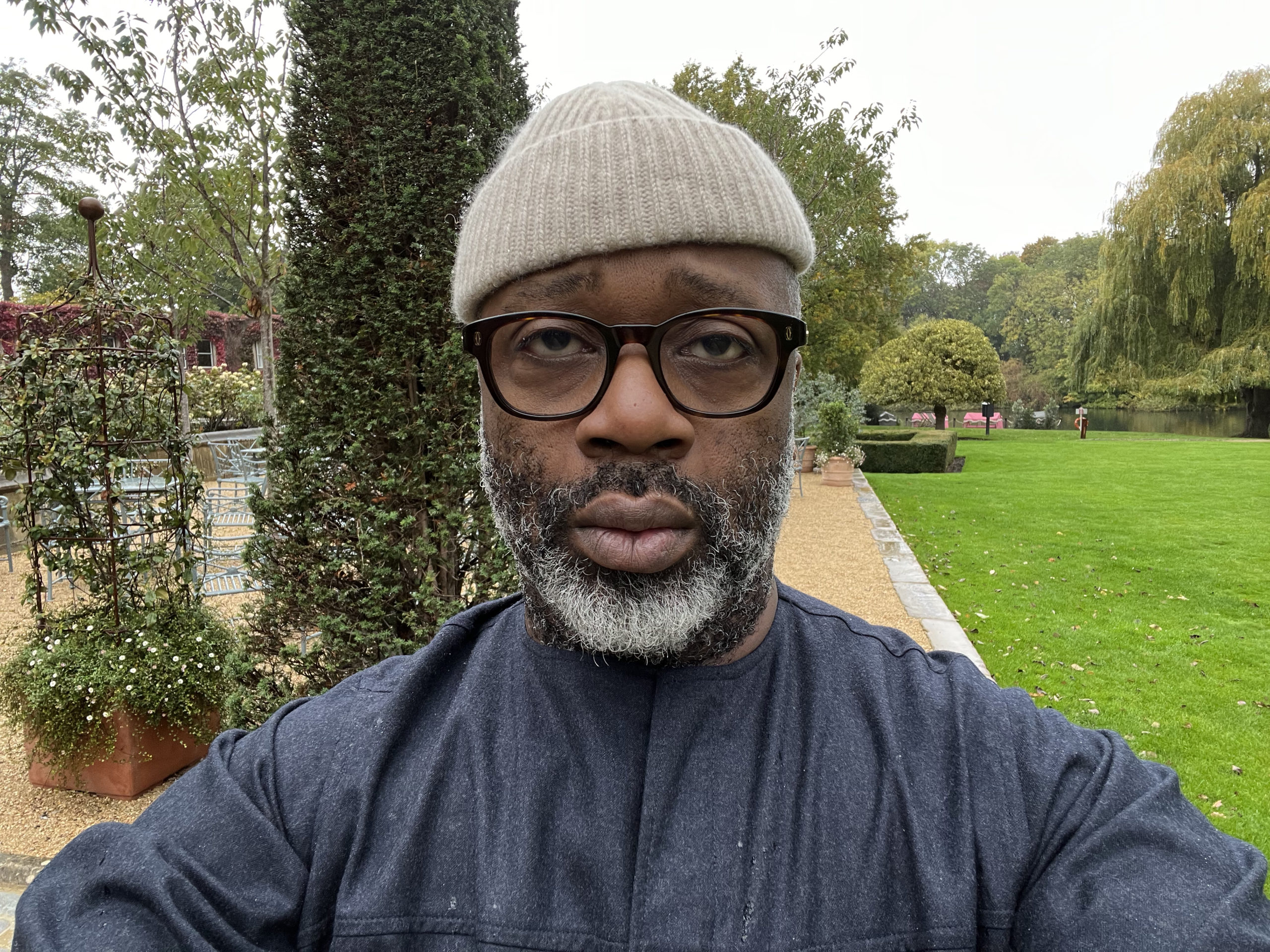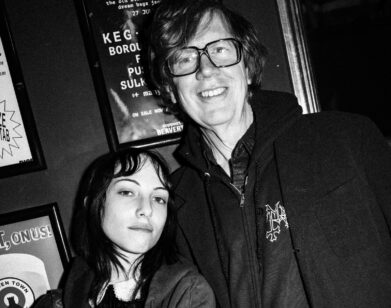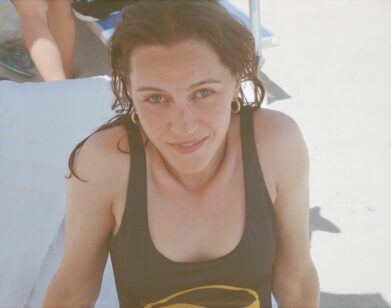IN CONVERSATION
“We Come to Fuck Shit Up”: Theaster Gates Gets Deep with Arthur Jafa
For Theaster Gates, art is an intellectual form and a life project. Throughout his prolific career, Gates has seamlessly moved between disciplines, creating a new, uplifting and complex narrative of the Black experience that incorporates layers of memories and references from the past. Young Lords and Their Traces, a large-scale survey of his work at the New Museum, marks the first time the Chicago-based visual artist’s various practices come together under one roof. And who better to speak with him about his show and the ideas it posits than kindred spirit Arthur Jafa, whose poignant visual essays (Daughters of the Dust, Love is the Message, the Message is Death) have helped define a new Black cinema? “What’s great in these situations,” Gates said on a video call with Jafa, “is that the world gets to understand that artists actually like each other, that we call each other, that we care about each other’s practices.” As they always do during their regularly scheduled phone conversations, Gates and Jafa covered a wide terrain, from their cosmic first encounter at Gates’ Black Artists Retreat to the late, great thinkers and innovators, like Virgil Alboh, who influenced and inspired them.—MEKA BOYLE
———
THEASTER GATES: Hey, AJ.
ARTHUR JAFA: Hey, man. What’s up?
GATES: How are you doing?
JAFA: I’m doing pretty good. Are you in Chicago now?
GATES: I’m in Chicago today, but I’m going back to New York tonight.
JAFA: Okay, maybe we can grab a drink or something.
GATES: I would love it.
JAFA: Is there anything you want to say before we get going?
GATES: Well, you know, these conversations are interesting because when we’re on the phone we cover so much territory.
JAFA: Yeah, totally.
GATES: Part of what’s great in these situations is that the world gets to understand that artists actually like each other, that we call each other, that we care about each other’s practices. I want to start by just saying thank you, man, for being an amazing friend and supporting me over the years.
JAFA: Well, obviously, I can’t even hear that without just saying right back at you. Of course, we met through Kerry [James Marshall], who’s one of my oldest friends and in some ways the first artist that I knew intimately. I met Kerry in LA in the early eighties right after he had finished at the Art Institute.
GATES: Let’s talk about it.
JAFA: I had run into another mutual friend and a great artist, Torkwase Dyson. I ran into her on the street right after I had made my film Dreams are Colder Than Death and Torkwase said “Yo, you’ve got to come to BAR [Gate’s Black Artists Retreat] with this.” I had actually wanted to come to Chicago to shoot some more. Chicago’s a Black site, right? You know what I mean?
GATES: Right.
JAFA: It’s one of the preeminent, if not the preeminent Black site in the US. Certainly in the North.
GATES: Absolutely.
JAFA: And I showed up at BAR and we had quite an incredible, verging on mythic, meeting. Like everybody else, I was in awe of BAR. I had some conversations during the course of those sessions that I still remember. “Does art have any inherent value?” I remember getting into big arguments with people about it. Then, after the sessions had finished, I’ll never forget you knocking at my door before 8am and saying “What are you doing?”’ And I was like, “sleeping.” You told me “Come roll with me,” and we proceeded to have three or four incredible days. I’ve never really quite experienced anything like it. To this day I don’t quite understand what possessed you to do it, not to be cryptic about it. I always look back on that as a moment, because I’ve said this to people before, but I think you recognized I was a visual artist before I recognized that I was a visual artist—that I should be in the company of Black visual artists as much if not more than in the company of Black filmmakers. I was scratching my head a little bit, but I’ll never forget one meeting we were in. At some point one of the people said, “Who is this?”
GATES: And I said you are my spiritual advisor.
JAFA: “Spiritual advisor.”
GATES: Absolutely
JAFA: And I cracked up internally, but I tried not to crack the performance. It was such an incredible introduction into the practice of being an artist, being able to see behind the curtain, so to speak. Before I ever met you, you had an aura, people were hearing things about the Rebuild Foundation, the Dorchester project in Chicago, and were somewhat amazed. Folks were really trying to get a handle on what it was you were doing and where you were coming from. I remember so many people said, “Oh, I heard you were hanging out with Theaster.” To a certain degree, one of the first things that I was aware of was a need to disabuse people of certain ideas they had about you. I like to say sometimes, as Black folks, we have to run a marathon just to get to the starting line.
GATES: AJ, man, it’s interesting and beautiful that you are recalling this story because I also remember getting a note from Kerry James saying “Hey, my guy is going to be in touch with you, look out for him.” Kerry James has never called me to ask me to look out for somebody. So I was like “Okay, whoever this cat is matters to Kerry James Marshall a lot.” It was obvious from the beginning that you had your own intellectual compass and that your North was maybe slightly different from other people’s North. And as a result, it was a conversation with Mike Cloud, the argument around representation and inherent value, which was one of the great conversations of the Black Artist Retreat. I think that the excitement was that artists among artists had as rigorous discourse as academics. We were highly trained, high-thinking people.
JAFA: Exactly. I remember saying to Greg [Tate], “What’s the word for this?” That was beyond generosity, that was something else. I felt a little bit like a fellow traveler even though I didn’t necessarily know the terrain. You took me under your wing. It was a really incredible way to enter what I think has been a continually developing exchange of ideas and affirmation. Because a lot of it is affirmation, too.
GATES: Absolutely.
JAFA: You’re definitely at the top of my list of people who I call if I don’t understand something. I like to say that there’s all kinds of Black folks, but one of the groups of Black folks I’m a member of is, I like to use the term the “Black Vulcans.” You are clearly a Black Vulcan in terms of how you operate. You’re such a student of the game. Because we know so much of this is the game. The work is one thing, but it’s the game of how to operate in these spaces, particularly as Black artists, because we all understand and have some sense now of how our entry into this particular realm, this arena, is a tsunami. A tsunami is happening now and it’s kind of undeniable.
GATES: I didn’t know it at the time but it was almost like I was getting ready for something. Being a professional visual artist was not the thing at the top of my horizon. I was moving through life fully shaped toward other things. Aesthetics and ability were already included, but the end game wasn’t art or the arts.
JAFA: Very much the same thing with me. When I first heard your name, or heard of you, first of all, you have that name that’s in the tradition of the Thelonius’s. It is an unusual name. I had never heard of a Theaster. You’re the only Theaster I’ve ever heard of. I don’t know if your parents made that name up or what.
GATES: It’s my dad’s name.
JAFA: Okay. Wow. “Theaster Gates.” That means openings, that means portals, that means a person who escorts us into spaces. It has mythic resonances. So the first time I heard your name, I didn’t necessarily hear the relationship to art. I heard that there’s this brother in Chicago and he’s a potter and an architect, a developer. Then I heard he’s an artist and I started seeing that you were doing shows. So I was already intrigued, to say the least. Then I started hearing about the Black Artist Retreat. It’s no surprise that the first Black president you know was engendered in Chicago.
GATES: I came up in a moment in the late 90s early 2000s when the very nature of the artistic project was being called into question. There was this new language on the street about a person who could not make a thing, or a person who could have other other investments in human beings, that might also account for an artistic endeavor. While I was studying ceramics and I was getting my stuff together around urban planning, I knew myself to be a maker, but not everybody knew that. What people started seeing were the gatherings which were always using my ceramic objects, but the gatherings, the things that grew in people’s minds, were of a more social nature through my buildings. I remember one time we had a conversation, AJ, where you said—I know you used the metaphor of running already—but you said, “The problem is, Theaster, we all got concrete on our on our shoes and we look up and here you come running and you ain’t got no concrete blocks.”
JAFA: Right.
GATES: And what happened, AJ, was that nobody told me I was or wasn’t an artist. Maybe people would say, “Okay, you’re a potter.” I wasn’t contending with the contemporary art world. I was a lover of the decorative arts and I found myself to be a fairly cerebral, conceptual kind of guy.
JAFA: That’s an understatement.
GATES: The way that I had clocked Dorchester was as a conceptual product. This is a life project and its durational, it’s an ongoing performance of neighborliness and my buildings are my objects. I was in this moment where I felt free to not be preoccupied with the commercialism and the market, but then I started throwing out these shoe shine stands and I made my first civil tapestry and in a way those things were responses to language, what I was reading, the state of the union, the election of Barack Obama. I found myself with form. And not just religious form or historical form or decorative form, I found myself with conceptual form—artistic, formal gestures in materials that would register to others as art. Young Lords is the first time where people get to see that formal artwork aggregated in one place.
JAFA: Well, let’s go for a second to the title before we get into talking about actual content of the show. Young Lords and Their Traces.
GATES: You know, I lost my dad this year. And in losing my dad and all of the people that you and I have collectively lost, it just felt like I didn’t have a show in me that couldn’t acknowledge the complexity of this emotional moment for me. It was hard for me to get through sentences if I mentioned his name. And you know, it’s not been a full year yet. So when I was invited less than a year ago, I knew my dad’s health was failing but I also had Virgil [Abloh] on my mind, bell hooks on my mind, Greg [Tate] on my mind. Loss was happening around us while gains were also present. I just thought, “How could I take a moment to account for the losses through the things that my friends left us?” So Young Lords a little bit about how we deify our loved ones, how they become minor deities in the altar of the pantheon of deities. They were not interested in the sermon even though they used the sermonic structure to talk about politics. They were not interested in god unless god had the ability to directly save the nation. But also, the Young Lords are those gods who have left us. And their traces are the stuff that I was trying to traffic in so that my soul could rest better.
JAFA: It seemed obvious to me, you know, the “Young Lords” reference. I’m thinking of Felipe Lopez and Denise Oliver-Velez, some of the members and the association with the Puerto Rican activist movement. But I’m also interested in something that’s a slightly dark undercurrent to it, if you want to say, because “Young Lords” also evokes the Young Disciples and the tradition of Chicago gangs.
GATES: Yeah, absolutely.
JAFA: It has that ghost hovering over it because we know one of the things about the gangs is that there’s always a kind of contentious conversation about any positive or any negative.
GATES: I’m definitely also thinking about the Conservative Vice Lords and the Blackstone Rangers. These cats on the Young Lords side, Joe Vicente Santos Guzman, maybe did bad things right alongside defending their Puerto Rican sisters and brothers against the cops. Right? They all may have sold a little hashish back in the 70’s and 80’s, but they were also looking out for each other because they almost needed that internal neighborhood self-protection in order to survive the crack pandemic.
JAFA: We know so much of everything we do—and I think of you as an absolute master of this—comes down to what Fred [Moten] has articulated so well: Black sociality. Mostly, what you’re always doing is trying to channel that Black sociality.
GATES: One of the things I have to grapple with myself and with the show is that one could feel a tremendous amount of anxiety about how to show up in New York. And I decided that rather than showing up with some kind of bombasticism or a show to defeat all shows, what I would do instead is demonstrate that I actually have my own emotional vulnerability. And that vulnerability is actually the most productive place to begin my artistic journey. If I start as a broken fugitive, if I accept my fugitivity, then what I can understand is that the only way that the world is going to work for me is if I am in direct conversation not with the super structures, government, law, history, the bank, I have to be in conversation with my god, in the soil, in the water, in the mountains. The thing that has kept us from captivity has been natural forces.
JAFA: You’re touching on something that’s so central to much of the conundrum of Black being I would say: this dual relationship to structure and freedom. You want to build a castle but you don’t want to be a prisoner of the thing that you built. We do need structure, we do need institutions, we do need continuity. At the same time, we are clearly a people traumatically invested in breaking things, breaking loose, breaking structures. I always felt like one of the big components of the resistance to Black participants in the visual arts arena in the realm is like, people know how we roll. We could come in there saying, “We just want to be one of the guys, we just want to be a part of the canon,” but they know we don’t know how to do anything but break shit. We come to fuck shit up.
GATES: In my practice, which isn’t necessarily only defined by Blackness, I talk about a spiritual practice, a sacred practice, I could talk about a spatialized racial practice. But in this case, if we’re talking about art and its history, I would be remiss not to mention Agnes Martin, not to mention Sam Gilliam, and not to mention Virgil Abloh, who in his own way pushed my generation.
JAFA: To me, one of the things that’s challenged the most, and I think it’s one of the things that you struggle with as a visual artist particularly when we enter into the space, we’re operating under a certain burden of dignity—feeling pure, like a pure expression, a pure articulation of a complex understanding of the conceptual frame of contemporary art and all that kind of jazz, right? But when you start moving to making these things that don’t comfortably sit in any of these spaces, it does something very weird. Virgil was really, really, really pushing that.
GATES: Especially if you do that and it registers as more public, more successful, more popular, then you get into strange correlations. Is my intellectual sense of myself as important as Virgil’s popularized set of activities? And if those things are living in the museum at the same time, what has happened in the museum if they’re allowing both this renegade fugitive named Virgil Abloh to be here. Virgil was really one of the people who was starting to look at fashion, the club, the party scene, the art scene, and looking at Black achievement and Black desire. Like, I want to be the number one hip-hop artist, I want to be the coldest DJ, I want to make the best Nikes. I want all the kids to love me. I want Naomi Campbell to love me. It was an even larger idea.
JAFA: If we operate inside of these frames that insist on purity, then we end up in these sort of internalized binary oppositions that make us disconnect from our actual selves. I have to get a basketball analogy in there. It’s just like, we didn’t invent basketball, but we created it. We didn’t invent the saxophone, but we created it. It is a kind of fugitivity. It is a kind of ongoing anarchy.
GATES: Well AJ, this is why it’s important to talk about Love Is the Message at this moment. When I first saw Love is the Message, it struck me as a lexicon for presenting the Black body in all of the ways that it’s fugitive, alien, obsessed, stressed, stretched.
JAFA: And ascending.
GATES: Even in the most brutal moments, here are moments where you can see Black resilience while Black subjectivity is happening. There are moments where fugitivity requires that you use all of your bodily and soulful and spiritual prowess, and you find yourself in sixth gear.
JAFA: Exactly. What’s so interesting, and I’ve talked about this a little bit before, it’s that there’s a way in which we know the parts of Black being that are, you could almost say, “superhuman.” Everybody’s familiar with Michael Jordan and Dr. Dre and Usain Bolt because that’s a part of Black expressivity. I like to say it’s on a polarity, there’s a spectrum. On one end of the pole is excess, surplus expressivity. We often bring that out. For example, with something like Love is the Message, it’s easy to talk about the speaking in tongues, these outbursts, these eruptions of Black being. There’s a moment in the film when the young brother is being arrested by the cop, his mom had turned him into a cop, and he says “Mama, please” and I cut to Miles Davis, it’s a shot where he barely moves, just his eyes move. If there’s speaking in tongues on one pole, on the other spectrum is holding your tongue.
GATES: Yeah.
JAFA: I’m really a fan of how your work can fluctuate between these two polarities. It has a sermonic dimension, but it’s got this other dimension that’s a kind of quieting, a kind of a prayer. It’s not the big sermonic prayer, it’s the prayer to yourself. I feel that when I move through this show from floor to floor. It’s not a uniform, it’s not monolithic. It’s complex and variegated. It does something that I think all the best solo shows do, which is look a little like the most incredible group show you’ve ever seen.
GATES: Exactly.
JAFA: They have a coherence in terms of the spirit and the conceptual frame of the thing, but the body is so varied. It’s so different from one expression of that conception to another. I love that aspect of your work.
GATES: Well, you know, one way to imagine the three floors—it’s three floors of the New Museum—the second floor is the mind. You’ve got the Robert Bird archive, which is this collection of Soviet and Russian literature and film. It also has my dad’s fur coat and the ways in which he understood swag, you know what I mean? It has the small keychain that Virgil kept with him from the time he realized he was sick until he passed. I could only get that gift from Shannon [Virgil’s wife]. I can only get those books from Robert Bird’s wife. It was a demonstration of the integrity of their minds and bodies. You go up to the third floor and it’s corporal, it’s the body itself, the vessel as the body, the vessel that houses the spirit. It is a container for the thing that cannot be contained. It’s somewhere for me between a mausoleum and a great neighborhood of minor architecture. It has something to do with ascension, with what happens when you no longer need the body, when you no longer need the mind, when you only need sound. All the things that are speaking are kind of invisible or they’re protecting you from things that are unseen. By the time I get to the top floor, that organ, the Hammond B3 is a tool that allows you to break into the presence of God, break into a relationship with your neighbor, break out of a bad week and into a better week, and then it allows you to break through. The breakthrough work that a tool like an organ and a speaker gives us, which is a different tool than the hoe, then the shovel, then the pickaxe, then the cotton gin. My mom knew how to hum her way through the world. She could moan and the lights would get paid, a check would come, or my auntie would throw us some food or some money.
JAFA: It’s the Black mantra, it’s the vibration that makes shit happen. Immaterial, but it made concrete shit happen.
GATES: It made concrete shit happen. For me, that second floor was me trying to give homage to people gone. The reason why your eulogy to Virgil is so important on Virgil’s vitrine is because it is through the words of the living that we continue to honor those who have passed. I don’t need a eulogy for Virgil. AJ said it all. I didn’t put Greg in the show because Greg wasn’t my boy like that. I didn’t want to miss-acknowledge, then that becomes journalism or obituary. And we’re talking about relationships. So I would rather invite my boy AJ to talk about how this show moves him to think of his boy Greg Tate, because that’s what we would talk about when we were on the phone.
JAFA: We talked about how the week before Greg passed, the thing I talked to him about more than anything is Virgil passing.
GATES: Yes!
JAFA: You get to a certain age, I’m 60 now, man, and it does give me comfort and solace when I see people coming up and I just say, ”They got it.”
GATES: They got it.
JAFA: But we’re not supposed to attend Virgil’s funeral, we just aren’t supposed to.
GATES: That’s right.
JAFA: He’s supposed to give eulogies at our funerals.
GATES: You know, it’s hard not to think about one’s own place on Earth, life on this plane. The years that we have, AJ, I’m gonna try to live the most fulfilled, impactful life that I can. Even if that means that I decide to retire in Japan and make the same tea bowl over and over again. Shit, I might become a brotherterian that that makes tea bowls and call it a day.
JAFA: I don’t necessarily want that for you because I want to see you continue to occupy these spaces. But I have to admit that shit sounds fucking dope. It sounds totally transformative. Because we know, for us, just surviving is number one, the greatest thing you can do. It’s very important for us to establish new paradigms. So what you just said about retiring to Japan and making tea bowls is about the deepest thing I’ve heard anybody say in several years.
GATES: It’s just one of those moments where you realize the labor that we put ourselves through in this art world, in this game, “Why do I do this?” I do it because I want to work out my soul’s stuff. I want the approval of my peers. I want the acknowledgement by an establishment that I believe in that the purpose of my life has meaning, that someone else can validate the purpose of my life. What happens when I don’t need those things anymore? When one doesn’t need validation anymore? When you’ve gotten through the ego? So when I call you, AJ, I’m not calling because I need anything or want anything. I’m calling you because a part of my life at this point is about these simple moments of fulfillment where one soul gets to rest with another soul and rap about it. I’m wishing myself time and I’m making time. That feels like the best work of art: making time.
JAFA: Hey, man, I think that’s it.
GATES: AJ, I love you so much, bro.
JAFA: Yeah, man. Same here. I love you.
GATES: I’ll see you in New York, man. Just let me know when you get there.
JAFA: Will do.







